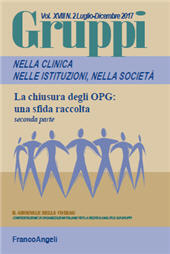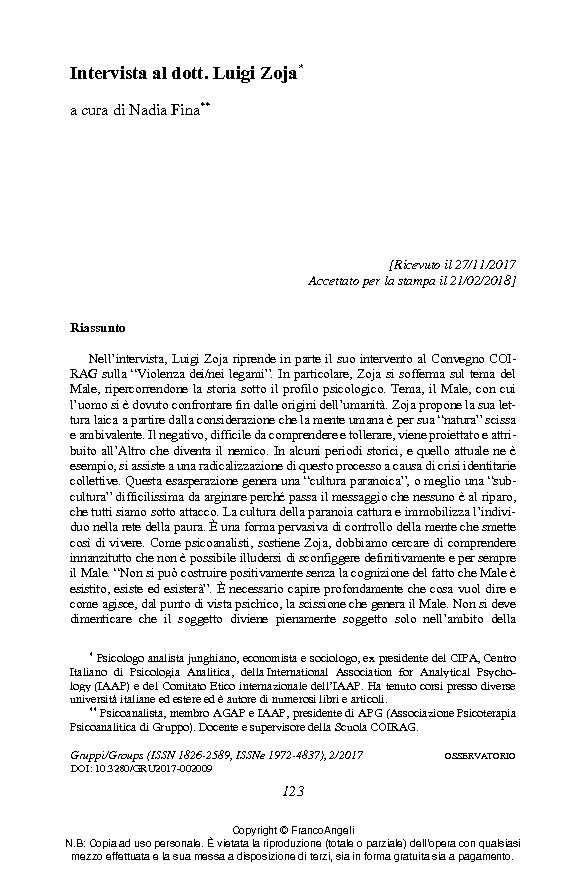Intervista al dott. Luigi Zoja
123-127 p.
Nell'intervista, Luigi Zoja riprende in parte il suo intervento al Convegno COIRAG sulla "Violenza dei/nei legami". In particolare, Zoja si sofferma sul tema del Male, ripercorrendone la storia sotto il profilo psicologico. Tema, il Male, con cui l'uomo si è dovuto confrontare fin dalle origini dell'umanità. Zoja propone la sua lettura laica a partire dalla considerazione che la mente umana è per sua "natura" scissa e ambivalente. Il negativo, difficile da comprendere e tollerare, viene proiettato e attribuito all'Altro che diventa il nemico. In alcuni periodi storici, e quello attuale ne è esempio, si assiste a una radicalizzazione di questo processo a causa di crisi identitarie collettive. Questa esasperazione genera una "cultura paranoica", o meglio una "sub-cultura" difficilissima da arginare perché passa il messaggio che nessuno è al riparo, che tutti siamo sotto attacco. La cultura della paranoia cattura e immobilizza l'individuo nella rete della paura. È una forma pervasiva di controllo della mente che
smette così di vivere. Come psicoanalisti, sostiene Zoja, dobbiamo cercare di comprendere innanzitutto che non è possibile illudersi di sconfiggere definitivamente e per sempre il Male. "Non si può costruire positivamente senza la cognizione del fatto che Male è esistito, esiste ed esisterà". È necessario capire profondamente che cosa vuol dire e come agisce, dal punto di vista psichico, la scissione che genera il Male. Non si deve dimenticare che il soggetto diviene pienamente soggetto solo nell'ambito della relazione. Il Male è espressione della fragilità umana e rinforza la cesura di quei collegamenti necessari tra parti intrapsichiche e intrarelazionali. [Testo dell'editore].
In his interview, Luigi Zoja recuperates part of the speech he made in the COIRAG Meeting on Violence. Zoja is particularily concerned with the subject of Evil, whose history is narrated in a psycological perspective. Evil is a fundamental problem that human beings have faced since their first origins. Zoja offers a laical interpretation, starting from the assumption that human mind is split and bivalent in its constitutive nature. What is negative, difficult to understand and accept, is projected and ascribed to the Other that consequently becomes the enemy. In some historical periods, and our present time is a good example, collective identity crises produce a radicalization of such process. This kind of exasperation produces a "paranoid culture", or more precisely a "sub-culture" that is really difficult to contain. Because the shared message is that nobody can be safe and that we are all under attack.
The culture of paranoia captures and paralyzses each individual in a net of fear. It's a pervasive form of mind control, that can arrest the life of the same mind. Being a psycoanalist, as Zoja argues, means that you must first of all understand the impossibility of defeating definitively the Evil. It's an illusion. "You cannot build something positive if you are not conscious of the fact that Evil exists, has existed, and will always exist". And it is extremely necessary to know how, on the psychical point of view, the scission generating the Evil is working and what it wants to say. It must never be forgotten that the subject becomes a real and complete subject only in the context of the relation. Evil is the expression of human fragility and as such strengthens the split of the necessary links between intra-psychical and intra-relational parts of the mind. [Publishers' text].
-
Articoli dello stesso fascicolo (disponibili singolarmente)
-
Informazioni
Codice DOI: 10.3280/GRU2017-002009
ISSN: 1972-4837
PAROLE CHIAVE
- Male, Scissione, Crisi di identità collettiva, Cultura della paranoia
- Evil, Spilt, Collettive identity crises, Paranoid culture



